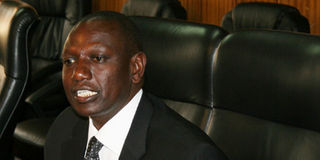We were induced to implicate Ruto, two claim

Eldoret North MP William Ruto. Two Kenyans have claimed they were enticed to link the suspended minister to the post election violence November 11, 2010. FILE
Two Kenyans have claimed they were enticed to link Eldoret North MP William Ruto to the post election violence.
In affidavits, Ken Braziz Wekesa and William Kepkemboi Rono, both residents of the expansive Rift Valley, said they received “upkeep money, paid up rental houses and promise of relocation outside Kenya,” to record statements with the Kenya National Commission on Human Rights and the judicial inquiry investigating the chaos, the Waki Commission.
They allege that they were given the inducements by KNCHR commissioner Hassan Omar to “coordinate and assemble witnesses” who testified before the commissions.
The Rift Valley was the epicentre of the violence that followed a disputed presidential election and left 1,133 people dead and thousands displaced from their homes.
But Mr Wekesa appeared to give contradicting pieces of information at a press conference in the exclusive apartments where he is currently being housed in Nairobi.
On one hand, he said he was a key witness of the violence; who also participated in planning, securing weapons and attacking members of the Kikuyu community in Eldoret.
“I am a witness of the killings that were carried out against supporters of the PNU (Party of National Unity) who were mainly from the Kikuyu community,” he told journalists.
“I also attended meetings that planned how the violence was to be carried out and we received instructions from our leaders in Nairobi.”
On the other hand, Mr Wekesa claimed that he was coerced by official of the human rights group to write a statement that implicated Mr Ruto.
It is not clear how Mr Wekesa was allegedly asked by the KNCHR to “twist” his statement.
“Hassan Omar wanted my statement to look like that of other witnesses,” Mr Wekesa said.
Last month, in an interview at Nation offices, Mr Wekesa said that his life was in danger and was requesting the International Criminal Court (ICC) to expedite his departure from the country.
At that time, he said that he could not understand why other witnesses had been flown out of the country and he was left behind.
But it later emerged that the ICC was not interested in his evidence as he was said to have compromised his status - by keeping contact with government officials - jeopardising the entire case.
On Tuesday, the suspended Higher Education minister claimed that Mr Omar recruited, coached and paid witnesses to implicate him in the chaos.
He said said the commissioner visited the Rift Valley town of Eldoret long before International Criminal Court field investigators started their probe to compromise witnesses.
The MP claimed he hired, coached and bribed six witnesses whose evidence is being relied on by the International Criminal Court to nail post election violence masterminds.
"Mr Hassan Omar talked about impunity. I want to inform Mr Hassan Omar that there is no greater impunity than to recruit and bribe witnesses to subvert the course justice in a process where so many lives of innocent Kenyans was lost,” Mr Ruto told a press conference at Parliament Buildings Tuesday.
“Mr Hassan Omar is the schemer and mercenary in this whole scheme. Let him respond to this. Did he travel to Eldoret to assemble witnesses who had been coached to testify before the Waki and the Human rights commission,” Mr Ruto further posed.
However, the KNCHR dismissed the allegations and demanded the Mr Ruto presents credible evidence to his bribery claims.
Similar sentiments were also shared by Justice minister Mutula Kilonzo, who told the Eldoret North MP to offer evidence of witness bribery and manipulation to the International Criminal Court (ICC) if he had any.
“I plead with Ruto and others who want to go to the Hague to meet Ocampo. If you have any evidence of witness manipulation, you have a responsibility to report it to Justice Rawal.”
KNCHR chair Ms Florence Jaoko said the commission recorded information from 46 senior police officers, 40 members of the Provincial Administration, 33 councillors and 10 then sitting and former MPs.
The commission, she added, also spoke to those affected by the violence and based its report of August 2008 on the statements and evidence from a total 1,102 people.
“The commission did not hire, the commission did not bribe, the commission did not influence or coach the witnesses,” said Mrs Jaoko, who was flanked by former vice chairman Hassan Omar and other commissioners.



